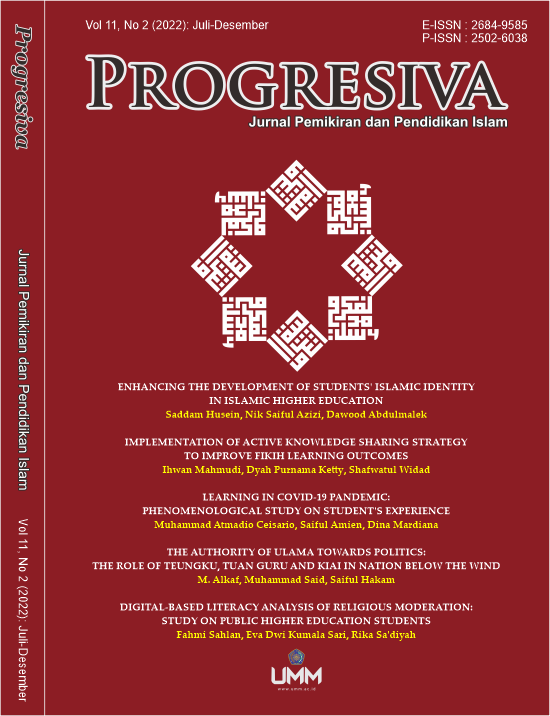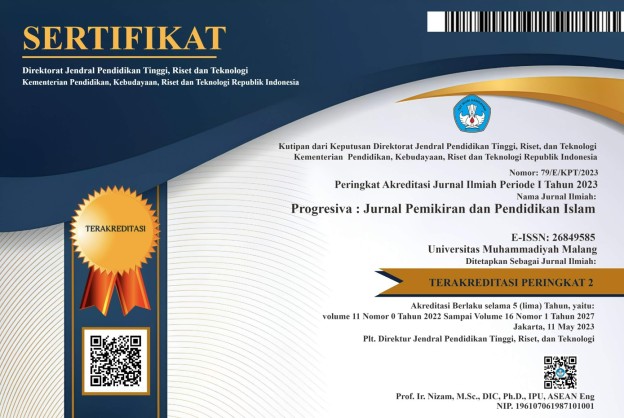Learning in Covid-19 Pandemic: Phenomenological Study on Student's Experience
DOI:
https://doi.org/10.22219/progresiva.v11i02.22745Keywords:
Covid-19, Online Learning, Pandemic, Phenomenology, Student ExperienceAbstract
The Covid-19 pandemic changed the learning atmosphere in Indonesia and over the world, from offline to online. Lecturers and students inevitably had to accept the change in learning direction imposed by the government to avoid the ferocity of the pandemic. This study aimed to describe the online learning experience of three Islamic Religious Education students through a phenomenological approach. The authors collected the data through in-depth interviews, transcribed it verbatim into a solid description, and analyzed it through descriptive-psychological phenomenology procedures. This research showed that online learning was an interesting experience at the beginning of the Covid-19 pandemic. However, it ended up disappointing because it was not optimal and ineffective, constrained by many obstacles, and expensive. More than that, the fatal impact for students was learning loss characterized by stress, loss of learning motivation and decreased knowledge/skills due to learning outputs. The results of this study recommended that educational policymakers, education practitioners, and parents should make efforts to assist students so they can get out of the learning loss phenomenon after the pandemic has passed.
Downloads
References
Adi, P. W., Martono, T., & Sudarno, S. (2021). Learning Failures and Barriers in Schools During a Pandemic at Indonesia: A Literature Review. Duconomics Sci-Meet (Education & Economics Science Meet), 1, 160–165. https://doi.org/10.37010/duconomics.v1.5436
Amien, S., Setyosari, P., Murtadho, N., & Sulton, S. (2022). “Ana Yahanu Faqat”: A Phenomenological Study on the Performance Character and Life Success. The Qualitative Report, 27(4), 945–964. https://doi.org/10.46743/2160-3715/2022.4916
Andriani, W., Subandowo, M., Karyono, H., & Gunawan, W. (2021). Learning Loss dalam Pembelajaran Daring di Masa Pandemi Corona. Prosiding Seminar Nasional - Pemberdayaan Teknologi Pembelajaran dalam Tatanan Multidisipliner di Era 4.0, 1(2), 484–501. http://snastep.com/proceeding/index.php/snastep/index
Aprianti, N., & Sugito, S. (2022). Pembelajaran dalam Pendidikan Anak Usia Dini Selama Masa Pandemi Covid-19: Sebuah Literature Review. Jurnal Obsesi: Jurnal Pendidikan Anak Usia Dini, 6(4), 2785–2794. https://doi.org/10.31004/obsesi.v6i4.1663
Argaheni, N. B. (2020). Sistematik Review: Dampak Perkuliahan Daring Saat Pandemi COVID-19 terhadap Mahasiswa Indonesia. PLACENTUM: Jurnal Ilmiah Kesehatan Dan Aplikasinya, 8(2), 99–108. https://doi.org/10.20961/placentum.v8i2.43008
Asmuni, A. (2020). Problematika Pembelajaran Daring di Masa Pandemi Covid-19 dan Solusi Pemecahannya. Jurnal Paedagogy, 7(4), 281–288. https://doi.org/10.33394/jp.v7i4.2941
Awalia, L. M., Pratiwi, I. A., & Kironoratri, L. (2021). Analisis Penggunaan Aplikasi Pembelajaran Daring terhadap Minat Belajar Siswa di Desa Karangmalang. Jurnal Basicedu, 5(5), 3940–3949. https://doi.org/10.31004/basicedu.v5i5.1354
Blaskó, Z., da Costa, P., & Schnepf, S. V. (2021). Learning Loss and Educational Inequalities in Europe: Mapping the Potential Consequences of the Covid-19 Crisis. SSRN Electronic Journal, 14298. https://doi.org/10.2139/ssrn.3833230
Broomé, R. E. (2013). The Lived-Experience of Leading a Successful Police Vehicle Pursuit: A Descriptive Phenomenological Psychological Inquiry. Journal of Phenomenological Psychology, 44(2), 220–243. https://doi.org/10.1163/15691624-12341256
Brown, N., Te Riele, K., Shelley, B., & Woodroffe, J. (2020). Learning at Home during COVID-19: Effects on Vulnerable Young Australians. In Peter Underwood Centre (Issue April). http://creativecommons.org/licenses/by/3.0/au/deed.en.Thefulllicencetermsareavailablefromhttp://creativecommons.org/licenses/by/3.0/au/legalcode.
Coman, C., Țîru, L. G., Meseșan-Schmitz, L., Stanciu, C., & Bularca, M. C. (2020). Online Teaching and Learning in Higher Education during the Coronavirus Pandemic: Students’ Perspective. Sustainability (Switzerland), 12(24), 1–22. https://doi.org/10.3390/su122410367
Crawford, J., & Cifuentes-Faura, J. (2022). Sustainability in Higher Education during the COVID-19 Pandemic: A Systematic Review. Sustainability (Switzerland), 14(3), 1–11. https://doi.org/10.3390/su14031879
Creswell, J., & Poth, C. (2018). Qualitative Inquiry & Research Design: Choosing Among Five Approaches (4th ed.). SAGE Publications.
Di Pietro, G., Biagi, F., Costa, P., Karpiński, Z., & Mazza, J. (2020). The Likely Impact of COVID-19 on Education: Reflections Bbased on the Eexisting Literature and Recent International Datasets. https://doi.org/10.2760/126686
Fitriyani, Y., Fauzi, I., & Sari, M. Z. (2020). Motivasi Belajar Mahasiswa Pada Pembelajaran Daring Selama Pandemik Covid-19. Jurnal Kependidikan, 6(2), 165–175. https://doi.org/10.33394/jk.v6i2.2654
Giorgi, A., & Gallegos, N. (2005). Living Through Some Positive Experiences of Psychotherapy. Journal of Phenomenological Psychology, 36(2), 195–218. https://doi.org/10.1163/156916205774651096
Giorgi, A., Giorgi, B., & Morley, J. (2017). The Descriptive Phenomenological Psychological Method. In C. Willig & W. S. Rogers (Eds.), The Sage Handbook of Qualitative Research In Psychology (2nd ed., pp. 176–192). SAGE Publications.
Giorgi, B. (2011). A Phenomenological Analysis of the Experience of Pivotal Moments in Therapy as Defined by Clients. Journal of Phenomenological Psychology, 42(1), 61–106. https://doi.org/10.1163/156916211X567497
Hadjeris, F. (2021). Revisiting Sustainable Development Goal 4 in the Context of COVID-19 Pandemic: A Case Study of Online Teaching in Algerian Higher Education Institutions. Human Behavior and Emerging Technologies, 3(1), 160–168. https://doi.org/10.1002/hbe2.245
Händel, M., Stephan, M., Gläser-Zikuda, M., Kopp, B., Bedenlier, S., & Ziegler, A. (2020). Digital Readiness and Its Effects on Higher Education Students’ Socio-Emotional Perceptions in The Context of the COVID-19 Pandemic. Journal of Research on Technology in Education, 54(2), 267–280. https://doi.org/10.1080/15391523.2020.1846147
Haryadi, R., & Selviani, F. (2021). Problematika Pembelajaran Daring di Masa Pandemi Covid-19. Academy of Education Journal, 12(2), 254–261. https://doi.org/10.47200/aoej.v12i2.447
Haser, Ç., Doğan, O., & Kurt Erhan, G. (2022). Tracing Students’ Mathematics Learning Loss During School Closures in Teachers’ Self-Reported Practices. International Journal of Educational Development, 88(December 2021), 0–2. https://doi.org/10.1016/j.ijedudev.2021.102536
Iqbal, S., & Sohail, S. (2021). The Challenges of Online Learning During the Covid-19 Pandemic. Journal of Gandhara Medical and Dental Science, 54(1), 46–57. https://doi.org/10.37762/jgmds.8-2.215
Jackson, C., Vaughan, D. R., & Brown, L. (2018). Discovering Lived Experiences through Descriptive Phenomenology. International Journal of Contemporary Hospitality Management, 30(11), 3309–3325. https://doi.org/10.1108/IJCHM-10-2017-0707
Kalimullina, O., Tarman, B., & Stepanova, I. (2021). Education in the Context Of Digitalization and Culture: Evolution of the Teacher’s Role, Pre-Pandemic Overview. Journal of Ethnic and Cultural Studies, 8(1), 226–238. https://doi.org/10.29333/ejecs/629
Kehoe, S. (2022). Denying Human Instincts Undermines Change. Https://Www.Strategytoperform.Com. https://www.strategytoperform.com/human-instincts--change.html
Khairunnisa, G. F., & Ilmi, Y. I. N. (2020). Media Pembelajaran Matematika Konkret Versus Digital: Systematic Literature Review di Era Revolusi Industri 4.0. Jurnal Tadris Matematika, 3(2), 131–140. https://doi.org/10.21274/jtm.2020.3.2.131-140
Khan, M. J., & Ahmed, J. (2021). Child Education in the Time of Pandemic: Learning Loss and Dropout. Children and Youth Services Review, 127(May 2021). https://doi.org/10.1016/j.childyouth.2021.106065
Kurniati, M., Arafat, Y., & Mulyadi. (2020). DevelopingTeacher’s Professionalism to Improve the Quality of Education in Remote Areas. International Journal of Educational Review, 2(2), 192–202.
Kurniawati, A. D., & Noviani, J. (2021). Indonesian Students’ Perception about the Effectivenessof E-Learning Implementation During COVID-19. New Educational Review, 66, 95–107. https://doi.org/10.15804/tner.2021.66.4.08
Langdridge, D. (2008). Phenomenology and Critical Social Psychology: Directions and Debates in Theory and Research. Social and Personality Psychology Compass, 2(3), 1126–1142. https://doi.org/10.1111/j.1751-9004.2008.00114.x
Lestariyanti, E. (2020). Mini-Review Pembelajaran Daring selama Pandemi Covid-19: Keuntungan dan Tantangan. Jurnal Prakarsa Paedagogia, 3(1). https://doi.org/10.24176/jpp.v3i1.4989
Lufung, T. Y. (2022). Technologies Utilization for Education Strategic Management in Social Distancing Era : A Literature Review. BIRCI-Journal, 5(2), 8165–8177. https://doi.org/10.33258/birci.v5i2.4599 8165
Mardiana, M. D., Mas’ud, A., Sibulo, M., Nofrianti, A. S. U., & Irawati, I. (2022). Pengaruh Pembelajaran Online Di Era Covid 19 terhadap Kesehatan Mental Mahasiswa. Jurnal Ilmiah Kesehatan Sandi Husada, 11(1), 271–281. https://doi.org/10.35816/jiskh.v11i1.751
Mengistie, T. A. (2021). Higher Education Students’ Learning in COVID-19 Pandemic Period: The Ethiopian Context. Research in Globalization, 3, 100059. https://doi.org/10.1016/j.resglo.2021.100059
Nicholson, N. (1998). How Hardwired is Human Behavior? Harvard Business Review, July-August, 134–147. https://www.researchgate.net/publication/13115707
Ningsih, S. (2020). Persepsi Mahasiswa terhadap Pembelajaran Daring pada Masa Pandemi Covid-19. JINOTEP (Jurnal Inovasi Dan Teknologi Pembelajaran), 7(2), 124–132. https://doi.org/10.17977/um031v7i22020p124
O’Keeffe, A. (2011). Hardwired Humans: Successful Leadership Using Human Instincts (1st ed.). Roundtable Press.
Oktaviani, C., Nurmaliah, C., & dan Mahidin. (2017). Implementasi Model Problem Based Learning terhadap Kreativitas Peserta Didik pada Materi Laju Reaksi di SMAN 4 Banda Aceh. Jurnal Pendidikan Sains Indonesia, 05(01), 12–19. https://jurnal.unsyiah.ac.id/JPSI/article/view/8402/6795
Oliveira, G., Grenha Teixeira, J., Torres, A., & Morais, C. (2021). An Exploratory Study on the Emergency Remote Education Experience of Higher Education Students and Teachers During the COVID-19 pandemic. British Journal of Educational Technology, 52(4), 1357–1376. https://doi.org/10.1111/bjet.13112
Patrinos, H., & Donnelly, R. (2021). Learning Loss During Covid-19: An Early Systematic Review. https://doi.org/10.21203/rs.3.rs-518655/v1
Pier, L., Christian, M., Tymeson, H., & Meyer, R. H. (2021). COVID-19 Impacts on Student Learning: Evidence from Interim Assessments in California (Issue June). https://edpolicyinca.org/publications/covid-19-impacts-student-learning
Pratama, H., Azman, M. N. A., Kassymova, G. K., & Duisenbayeva, S. S. (2020). The Trend in Using Online Meeting Applications for Learning During the Period of Pandemic COVID-19: A Literature Review. Journal of Innovation in Educational and Cultural Research, 1(2), 58–68. https://doi.org/10.46843/jiecr.v1i2.15
Pratiwi, W. D. (2021). Dinamika Learning Loss: Guru dan Orang Tua. Jurnal Edukasi Nonformal, 2(1), 147–153.
Purwasih, R., & Elshap, D. S. (2021). Belajar Bersama COVID-19: Review Implementasi, Tantangan dan Solusi Pembelajaran Daring pada Guru-Guru SMP. AKSIOMA: Jurnal Program Studi Pendidikan Matematika, 10(2), 940–950. https://doi.org/10.24127/ajpm.v10i2.3545
Putri, R. S., Purwanto, A., Pramono, R., Asbari, M., Wijayanti, L. M., & Hyun, C. C. (2020). Impact of the COVID-19 Pandemic on Online Home Learning: An Explorative Study Of Primary Schools in Indonesia. International Journal of Advanced Science and Technology, 29(5), 4809–4818.
Syarif, A., & Mawardi, I. (2021). Analisis Kebijakan Pembelajaran di Masa Pandemi Covid-19; Antara Peluang dan Tantangan serta Dampaknya terhadap Pendidikan Islam (Studi di SMP Muhammadiyah 1 Pati). Urecol Journal. Part A: Education and Training, 1(1), 9–19. https://doi.org/10.53017/ujet.20
Wahyono, P., Husamah, H., & Budi, A. S. (2020). Guru Profesional di Masa Pandemi COVID-19: Review Implementasi, Tantangan, dan Solusi Pembelajaran Daring. Jurnal Pendidikan Profesi Guru, 1(1), 51–65. https://doi.org/10.22219/jppg.v1i1.12462
Wahyudi, A. (2021). Learning Loss during Covid-19 Pandemic in Indonesia and the Strategies to Minimize It. Journal of English Education and Linguistics, 2(2), 18–25.
Yeomans, M. M., Martínez-Libano, J., & Silva, A. (2021). Emotional Exhaustion in Chilean Higher Education Students during the Pandemic: Analysis by Gender. Psychology and Education, June. https://doi.org/10.13140/RG.2.2.22627.89127
Zhafira, N. H., Ertika, Y., & Chairiyaton. (2020). Persepsi Mahasiswa terhadap Perkuliahan Daring sebagai Sarana Pembelajaran Selama Masa Karantina Covid-19. Jurnal Bisnis Dan Kajian Strategi Manajemen, 4(1), 37–45. https://doi.org/10.35308/jbkan.v4i1.1981
Downloads
Published
How to Cite
Issue
Section
License
Copyright (c) 2022 Muhammad Atmadio Ceisario, Saiful Amien, Dina Mardiana

This work is licensed under a Creative Commons Attribution-ShareAlike 4.0 International License.


















